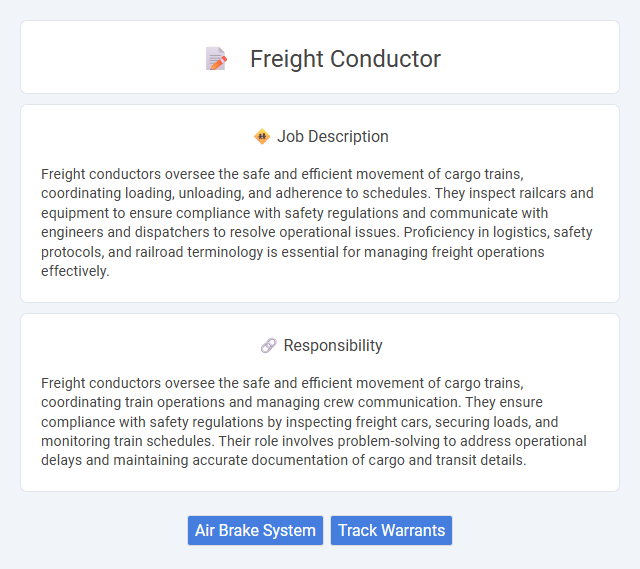
Freight conductors oversee the safe and efficient movement of cargo trains, coordinating loading, unloading, and adherence to schedules. They inspect railcars and equipment to ensure compliance with safety regulations and communicate with engineers and dispatchers to resolve operational issues. Proficiency in logistics, safety protocols, and railroad terminology is essential for managing freight operations effectively.
Freight conductor roles may be more suitable for individuals who can handle physically demanding tasks and endure long hours in varying weather conditions. Those with strong organizational skills and the ability to stay alert during extended shifts will likely perform better in this position. People with underlying health issues or difficulty with irregular schedules might find this job challenging.
Qualification
Freight conductors typically require a high school diploma or GED, with on-the-job training provided by employers or rail companies. Key qualifications include strong knowledge of railroad safety regulations, ability to coordinate freight car movements, and physical stamina to handle demanding environments. Certification such as a conductor's certification from the Federal Railroad Administration (FRA) is often necessary for regulatory compliance and career advancement.
Responsibility
Freight conductors oversee the safe and efficient movement of cargo trains, coordinating train operations and managing crew communication. They ensure compliance with safety regulations by inspecting freight cars, securing loads, and monitoring train schedules. Their role involves problem-solving to address operational delays and maintaining accurate documentation of cargo and transit details.
Benefit
Freight conductor jobs are likely to offer competitive pay and comprehensive benefits, including health insurance and retirement plans that improve financial security. Opportunities for overtime and bonuses might enhance overall earnings potential, making the role attractive for steady income. The job may also provide valuable training and career advancement possibilities, increasing long-term employment prospects.
Challenge
Freight conductor jobs likely present challenges involving coordination of complex logistics and strict adherence to safety protocols. Managing time-sensitive cargo and unexpected delays may require quick problem-solving and adaptability. The role probably demands constant vigilance to prevent accidents and ensure efficient train operations.
Career Advancement
Freight conductor roles offer significant career advancement opportunities through gaining experience in train operations, safety protocols, and team leadership. Mastery in freight logistics and adherence to federal transportation regulations enables promotion to positions such as trainmaster, yardmaster, or railroad operations manager. Continuous training and certification in advanced rail technologies further enhance prospects for advancement within the railroad industry.
Key Terms
Air Brake System
Freight conductors play a critical role in managing and ensuring the safety of train air brake systems, which are essential for controlling train speed and stopping forces. They regularly inspect air brake components, monitor brake pipe pressure, and coordinate with engineers to maintain proper brake functionality and prevent accidents. Mastery of the air brake system enhances a freight conductor's ability to oversee train operations and respond effectively to emergency braking situations.
Track Warrants
Freight conductors manage train operations by coordinating with dispatchers to receive and comply with track warrants, which are essential for authorizing movement on specific sections of the railway. Track warrants provide detailed instructions that ensure safety and prevent collisions by regulating track usage times and locations. Mastery of track warrant control protocols is critical for freight conductors to maintain efficient and secure rail transport.
 kuljobs.com
kuljobs.com